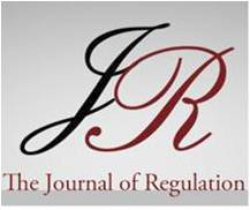I-0.2 Débats autour de l'évolution de la régulation bancaire et ses impacts

ENGLISH
After a video recording of his first conference devoted to the relations between Regulation and Supreme Courts, The Journal of Regulation published a book on the future of the audit, based on another conference. This present document, written in French worked with KPMG, from conference co-hosted with this company and the "Ecole de Droit de la Sorbonne", is devoted to the debates around banking regulation and its impacts. The challenge is to enable the persons concerned, that is to say to all citizens to express their opinion on an issue that concerns them directly, but whose technical dimensions, real or serviced, stand them aloof.
FRENCH
Après sa vidéo retraçant sa première conférence consacrée aux relations entre la régulation et les Cours suprêmes, le Journal of Regulation a publié un libre sur L’avenir de l’audit, consacré sur la conférence suite. La présente publication, écrite en française, élaborée avec KPMG, à partir de la conférence organise avec celle-ci et l’Ecole de Droit de la Sorbonne, est consacrée aux Débats autour de la régulation bancaire et ses impacts. L’enjeu est de rendre les personnes concernées, c’est-à-dire tous les citoyens, aptes à exprimer leurs opinion sur un sujet qui les concerne tous directement mais dont la technicité, réelle ou entretenue, les tient à l’écart.
To read the book, click here.
Written in French, this book ensures not being technical.
This book of 60 pages is an extension of the symposium held on this issue May 31, 2012 in Paris on this subject, organized by The Journal of Regulation, l’Ecole de Droit de la Sorbonne (Paris I) et KPMG.
Indeed, banking regulation not only affects all businesses, beyond the banks, but also all human beings.
However, the technical nature of speech and closing circles are such that these issues are not easy to discuss for ordinary people, who support the changes and have no say. Issues and political risks appear so.
The aim of this book is to "undo" what changed the banking regulator, in its dealings with the finance, accounting, States, markets for goods and services, the labor market, etc., For better "renew "nesting and return it as a possible object of democratic debate.
This will in particular that the outlet does not take the form of scapegoating.
In addition, the regulation is a technique, but these effects are immediate in the economy called "real" and those who move must speak about it. The two are related and interventions of the day trying to meet two objectives: to make "debatable" the evolution of bank regulation, even though it appears technically intricate, because it has significant impacts on the lives of people to be able to speak.
The legitimacy of the regulators involved would be enhanced thereby.
The authors are :
- Fabrice Odent,
- Christian de Boissieu,
- Jean-Louis Bancel,
- Jacques Gounon,
- Samuel Jubé,
- Georges Pauget,
- Jérôme Cazes,
- Michel Cardona,
- Pierre-Henri Conac,
- Michel Rasle,
- Hervé Pisani,
- Martine Samuelian,
- Hubert de Vauplane,
- Pierre-Mathieu Duhamel,
- Marie-Anne Frison-Roche


your comment